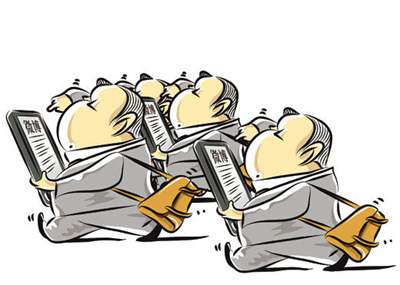(Ecns.cn)--"No.1 Hankoubei Road, Wuhan, 3:30 a.m. December 16, a female sanitation worker in her fifties is cleaning a stretch of road, trailed by her three-year-old grandson. After finishing up, their routine is to go to a breakfast stall and share a bowl of rice noodles. It is a painful scene."
This is a microblog posted on December 19 by Ye Qing, 49, who happens to be deputy director of the Hubei Province Statistics Bureau. He likes drinking tea and sharing his experiences and opinions online.
Ye Qing graduated from Zhongnan University of Economics and Law and worked as a teacher for twenty years. He calls himself an intellectual, a scholar, and a member of some democratic party.
Ye Qing's identity as an official makes his blog stand out among millions of other Chinese microbloggers. To some extent, what Ye tweets represents the government and his professional peers there. But among the nearly ten thousand other official microbloggers, Ye is an ordinary enough character.
It has been a longstanding convention that officials keep a low public profile. However, times change; officials are now routinely using microblogs to message and inform the public. And the microblog door swings both ways, giving the public an opportunity to observe the personalities of their officials and sense when the winds of change are blowing in government circles.
According to Top Ten Official Microbloggers, a report by the Public Sentiment Research Center released in August, seven of them are deputy leaders of different ranks. Those who are second-in-command prove to be more "talkative" than the highest ranking leaders. Why?
Deputy leaders in any government organ usually feel less pressure and have more freedom of speech than those at the top, Ye Qing hypothesizes. "There are several deputy leaders in one institute, so it is not a given that we deputy leaders will be promoted; we don't need to speak and act over-cautiously every minute of every day. Having only modest hopes of achieving the top spot, you find the guts to speak out for justice." Ye Qing told China Economic Weekly on December 20.
Effective communication is preferable to being non-responsive, and an important value in the climate that prevails today in Chinese officialdom, says Liao Xinbo, deputy director of the Guangdong Health Department.
But still, the rule of thumb about careful speech and action is generally what most Chinese officials follow. Officials with a reputation for bold speech online are uncommon.
Ye Qing says he is not afraid of public criticism, explaining "Everyday someone gets a scolding. When this person is me, I take it, as I am on duty." His lack of concern extends to the possibility that his speech might offend some of his colleagues, admitting, "I don't care, as in any case, I never get many votes in my work unit."
Cai Qi, the minister in the Zhejiang Ministry of Organization, is typical of the official microblogger. He labels himself as "a huge fan of Apple", "a Bolshevik" and "Senior classmate" on Tencent Weibo, a community of millions of young Chinese netizens.
Within one year, Cai issued 3,972 microblogs and got the attention of 5,853,542 microblog users, reports China Economic Weekly.
Cai Qi participated in the rescue operation of the 7.23 Wenzhou Railway Accident issuing reports on the situation from the site via more than twenty posts. Cai was also the first to openly question the Ministry of Railways about it online. His post asked "In the face of such a huge accident, how could you base excuses on the weather and technical factors? Who will take responsibility? The Ministry of Railways will learn from this. Safety is the first principle, not speed." Responses to this microblog were overwhelmingly supportive and forwarded 65,817 times.
Liao Xinbo, a Guangdong official, believes microblogging poses high political risks. "My leader once told me that he supported me on some issues, but he thought it was inappropriate for me to speak out on the Internet." said Liao. "I don't take microblogging for a game," he adds, "but an extra job task I need to work hard at."


















